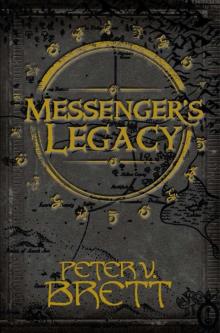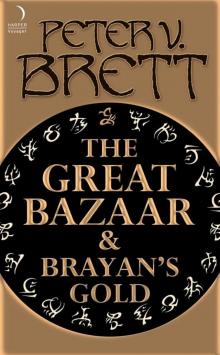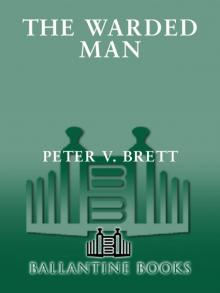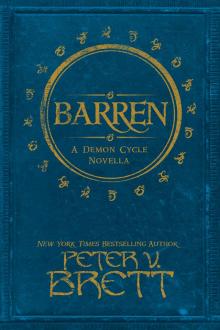- Home
- Peter V. Brett
The Warded Man Page 2
The Warded Man Read online
Page 2
Cobie had tortured Arlen for years, and the other children had gone along. Jeph’s farm was the northernmost in the Brook, far from where the children tended to gather in Town Square, and Arlen spent most of his free time wandering the Brook by himself. Sacrificing him to Cobie’s wrath seemed a fair trade to most children.
Whenever Arlen went fishing, or passed by Fishing Hole on the way to Town Square, Cobie and his friends seemed to hear about it, and were waiting in the same spot on his way home. Sometimes they just called him names, or pushed him, but other times he came home bloody and bruised, and his mother shouted at him for fighting.
Finally, Arlen had enough. He left a stout stick hidden in that spot, and the next time Cobie and his friends pounced, Arlen pretended to run, only to produce the weapon as if from thin air and come back swinging.
Cobie was the first one struck, a hard blow that left him crying in the dirt with blood running from his ear. Willum received a broken finger, and Gart walked with a limp for over a week. It had done nothing to improve Arlen’s popularity among the other children, and Arlen’s father had caned him, but the other boys never bothered him again. Even now, Cobie gave him a wide berth and flinched if Arlen made a sudden move, even though he was bigger by far.
“Survivors!” Bil Baker called suddenly, standing by a collapsed house at the edge of the Cluster. “I can hear them trapped in the root cellar!”
Immediately, everyone dropped what they were doing and rushed over. Clearing the rubble would take too long, so the men began to dig, bending their backs with silent fervor. Soon after, they broke through the side of the cellar, and began hauling out the survivors. They were filthy and terrified, but all were very much alive. Three women, six children, and one man.
“Uncle Cholie!” Arlen cried, and his mother was there in an instant, cradling her brother, who stumbled drunkenly. Arlen ran to them, ducking under his other arm to steady him.
“Cholie, what are you doing here?” Silvy asked. Cholie seldom left his workshop in Town Square. Arlen’s mother had told the tale a thousand times of how she and her brother had run the farrier’s shop together before Jeph began breaking his horses’ shoes on purpose for a reason to come court.
“Came to court Ana Cutter,” Cholie mumbled. He pulled at his hair, having already torn whole clumps free. “We’d just opened the bolt-hole when they came through the wards …” His knees buckled, pulling Arlen and Silvy down with his weight. Kneeling in the dirt, he wept.
Arlen looked at the other survivors. Ana Cutter wasn’t among them. His throat tightened as the children passed. He knew every one of them; their families, what their houses were like inside and out, their animals’ names. They met his eyes for a second as they went by, and in that moment, he lived the attack through their eyes. He saw himself shoved into a cramped hole in the ground while those unable to fit turned to face the corelings and the fire. Suddenly he started gasping, unable to stop until Jeph slapped him on the back and brought him to his senses.
They were finishing a cold midday meal when a horn sounded on the far side of the Brook.
“Not two in one day?” Silvy gasped, covering her mouth.
“Bah,” Selia grunted. “At midday? Use your head, girl!”
“Then what …?”
Selia ignored her, rising to fetch a horn blower to signal back. Keven Marsh had his horn ready, as the folks from Soggy Marsh always did. It was easy to get separated in the marshes, and no one wanted to be wandering lost when the swamp demons rose. Keven’s cheeks inflated like a frog’s chin as he blew a series of notes.
“Messenger horn,” Coran Marsh advised Silvy. A graybeard, he was Speaker for Soggy Marsh and Keven’s father. “They prob’ly saw the smoke. Keven’s telling ’em what’s happened and where everyone is.”
“A Messenger in spring?” Arlen asked. “I thought they come in the fall after harvest. We only finished planting this past moon!”
“Messenger never came last fall,” Coran said, spitting foamy brown juice from the root he was chewing through the gap of his missing teeth. “We been worried sumpin’ happened. Thought we might not have a Messenger bring salt till next fall. Or maybe that the corelings got the Free Cities and we’s cut off.”
“The corelings could never get the Free Cities,” Arlen said.
“Arlen, shush your mouth!” Silvy hissed. “He’s your elder!”
“Let the boy speak,” Coran said. “Ever bin to a free city, boy?” he asked Arlen.
“No,” Arlen admitted.
“Ever know anyone who had?”
“No,” Arlen said again.
“So what makes you such an expert?” Coran asked. “Ent no one been to one ’cept the Messengers. They’re the only ones what brave the night to go so far. Who’s to say the Free Cities ent just places like the Brook? If the corelings can get us, they can get them, too.”
“Old Hog is from the Free Cities,” Arlen said. Rusco Hog was the richest man in the Brook. He ran the general store, which was the crux of all commerce in Tibbet’s Brook.
“Ay,” Coran said, “an’ old Hog told me years ago that one trip was enough for him. He meant to go back after a few years, but said it wasn’t worth the risk. So you ask him if the Free Cities are any safer than anywhere else.”
Arlen didn’t want to believe it. There had to be safe places in the world. But again the image of himself being thrown into the cellar flashed across his mind, and he knew that nowhere was truly safe at night.
The Messenger arrived an hour later. He was a tall man in his early thirties, with cropped brown hair and a short, thick beard. Draped about his broad shoulders was a shirt of metal links, and he wore a long dark cloak with thick leather breeches and boots. His mare was a sleek brown courser. Strapped to the horse’s saddle was a harness holding a number of different spears. His face was grim as he approached, but his shoulders were high and proud. He scanned the crowd and spotted the Speaker easily as she stood giving orders. He turned his horse toward her.
Riding a few paces behind on a heavily laden cart pulled by a pair of dark brown mollies was the Jongleur. His clothes were a brightly colored patchwork, and he had a lute resting on the bench next to him. His hair was a color Arlen had never seen before, like a pale carrot, and his skin was so fair it seemed the sun had never touched it. His shoulders slumped, and he looked thoroughly exhausted.
There was always a Jongleur with the annual Messenger. To the children, and some of the adults, the Jongleur was the more important of the two. For as long as Arlen could remember, it had been the same man, gray-haired but spry and full of cheer. This new one was younger, and he seemed sullen. Children ran to him immediately, and the young Jongleur perked up, the frustration melting from his face so quickly Arlen began to doubt it was ever there. In an instant, the Jongleur was off the cart and spinning his colored balls into the air as the children cheered.
Others, Arlen among them, forgot their work, drifting toward the newcomers. Selia whirled on them, having none of it. “The day is no longer because the Messenger’s come!” she barked. “Back to your work!”
There were grumbles, but everyone went back to work. “Not you, Arlen,” Selia said. “Come here.” Arlen pulled his eyes from the Jongleur and went to her as the Messenger arrived.
“Selia Barren?” the Messenger asked.
“Just Selia will do,” Selia replied primly. The Messenger’s eyes widened, and he blushed, the tops of his pale cheeks turning a deep red above his beard. He leapt down from his horse and bowed low.
“Apologies,” he said. “I did not think. Graig, your usual Messenger, told me that’s what you were called.”
“It’s pleasing to know what Graig thinks of me after all these years,” Selia said, sounding not at all pleased.
“Thought,” the Messenger corrected. “He’s dead, ma’am.”
“Dead?” Selia asked, looking suddenly sad. “Was it …?”
The Messenger shook his head. “It was a chill took him, no
t corelings. I’m Ragen, your Messenger this year, as a favor to his widow. The guild will select a new Messenger for you starting next fall.”
“A year and a half again before the next Messenger?” Selia asked, sounding like she was readying a scolding. “We barely made it through this past winter without the fall salt,” she said. “I know you take it for granted in Miln, but half our meat and fish spoiled for lack of proper curing. And what of our letters?”
“Sorry, ma’am,” Ragen said. “Your towns are well off the common roads, and paying a Messenger to commit for a month and more of travel each year is costly. The Messengers’ Guild is shorthanded, what with Graig catching that chill.” He chuckled and shook his head, but noticed Selia’s visage darken in response.
“No offense meant, ma’am,” Ragen said. “He was my friend as well. It’s just … it’s not many of us Messengers get to go with a roof above, a bed below, and a young wife at our side. The night usually gets us before that, you see?”
“I do,” Selia said. “Do you have a wife, Ragen?” she asked.
“Ay,” the Messenger said, “though to her pleasure and my pain, I see my mare more than my bride.” He laughed, confusing Arlen, who didn’t think having a wife not miss you was funny.
Selia didn’t seem to notice. “What if you couldn’t see her at all?” she asked. “What if all you had were letters once a year to connect you to her? How would you feel to hear your letters would be delayed half a year? There are some in this town with kin in the Free Cities. Left with one Messenger or another, some as much as two generations gone. Those people ent going to come home, Ragen. Letters are all we have of them, and they of us.”
“I am in full agreement with you, ma’am,” Ragen said, “but the decision is not mine to make. The duke …”
“But you will speak to the duke upon your return, yes?” Selia asked.
“I will,” he said.
“Shall I write the message down for you?” Selia asked.
Ragen smiled. “I think I can remember it, ma’am.”
“See that you do.”
Ragen bowed again, still lower. “Apologies, for coming to call on such a dark day,” he said, his eyes flicking to the funeral pyre.
“We cannot tell the rain when to come, nor the wind, nor the cold,” Selia said. “Not the corelings, either. So life must go on despite these things.”
“Life goes on,” Ragen agreed, “but if there’s anything I or my Jongleur can do to help; I’ve a strong back and I’ve treated coreling wounds many times.”
“Your Jongleur is helping already,” Selia said, nodding toward the young man as he sang and did his tricks, “distracting the young ones while their kin do their work. As for you, I’ve much to do over the next few days, if we’re to recover from this loss. I won’t have time to hand the mail and read to those who haven’t learned their letters.”
“I can read to those who can’t, ma’am,” Ragen said, “but I don’t know your town well enough to distribute.”
“No need,” Selia said, pulling Arlen forward. “Arlen here will take you to the general store in Town Square. Give the letters and packages to Rusco Hog when you deliver the salt. Most everyone will come running now that the salt’s in, and Rusco’s one of the few in town with letters and numbers. The old crook will complain and try to insist on payment, but you tell him that in time of trouble, the whole town must throw in. You tell him to give out the letters and read to those who can’t, or I’ll not lift a finger the next time the town wants to throw a rope around his neck.”
Ragen looked closely at Selia, perhaps trying to tell if she was joking, but her stony face gave no indication. He bowed again.
“Hurry along, then,” Selia said. “Lift your feet and you’ll both be back as everyone is readying to leave here for the night. If you and your Jongleur don’t want to pay Rusco for a room, any here will be glad to offer their homes.” She shooed the two of them away and turned back to scold those pausing their work to stare at the newcomers.
“Is she always so … forceful?” Ragen asked Arlen as they walked over to where the Jongleur was mumming for the youngest children. The rest had been pulled back to work.
Arlen snorted. “You should hear her talk to the graybeards. You’re lucky to get away with your skin after calling her ‘Barren.’”
“Graig said that’s what everyone called her,” Ragen said.
“They do,” Arlen agreed, “just not to her face, unless they’re looking to take a coreling by the horns. Everyone hops when Selia speaks.”
Ragen chuckled. “And her an old Daughter, at that,” he mused. “Where I come from, only Mothers expect everyone to jump at their command like that.”
“What difference does that make?” Arlen asked.
Ragen shrugged. “Don’t know, I suppose,” he conceded. “That’s just how things are in Miln. People make the world go, and Mothers make people, so they lead the dance.”
“It’s not like that here,” Arlen said.
“It never is, in the small towns,” Ragen said. “Not enough people to spare. But the Free Cities are different. Apart from Miln, none of the others give their women much voice at all.”
“That sounds just as dumb,” Arlen muttered.
“It is,” Ragen agreed.
The Messenger stopped, and handed Arlen the reins to his courser. “Wait here a minute,” he said, and headed over to the Jongleur. The two men moved aside to talk, and Arlen saw the Jongleur’s face change again, becoming angry, then petulant, and finally resigned as he tried to argue with Ragen, whose face remained stony throughout.
Never taking his glare off the Jongleur, the Messenger beckoned with a hand to Arlen, who brought the horse over to them.
“… don’t care how tired you are,” Ragen was saying, his voice a harsh whisper, “these people have grisly work to do, and if you need to dance and juggle all afternoon to keep their kids occupied while they do it, then you’d damn well better! Now put your face back on and get to it!” He grabbed the reins from Arlen and thrust them at the man.
Arlen got a good look at the young Jongleur’s face, full of indignation and fear, before the Jongleur took notice of him. The second he saw he was being watched, the man’s face rippled, and a moment later he was the bright, cheerful fellow who danced for children.
Ragen took Arlen to the cart and the two climbed on. Ragen snapped the reins, and they turned back up the dirt path that led to the main road.
“What were you arguing about?” Arlen asked as the cart bounced along.
The Messenger looked at him a moment, then shrugged. “It’s Keerin’s first time so far out of the city,” he said. “He was brave enough when there was a group of us and he had a covered wagon to sleep in, but when we left the rest of our caravan behind in Angiers, he didn’t do near as well. He’s got day-jitters from the corelings, and it’s made him poor company.”
“You can’t tell,” Arlen said, looking back at the cartwheeling man.
“Jongleurs have their mummers’ tricks,” Ragen said. “They can pretend so hard to be something they’re not that they actually convince themselves of it for a time. Keerin pretended to be brave. The guild tested him for travel and he passed, but you never really know how people will hold up after two weeks on the open road until they do it for real.”
“How do you stay out on the roads at night?” Arlen asked. “Da says drawing wards in the dirt’s asking for trouble.”
“Your da is right,” Ragen said. “Look in that compartment by your feet.”
Arlen did, and produced a large bag of soft leather. Inside was a knotted rope, strung with lacquered wooden plates bigger than his hand. His eyes widened when he saw wards carved and painted into the wood.
Immediately, Arlen knew what it was: a portable warding circle, large enough to surround the cart and more besides. “I’ve never seen anything like it,” Arlen said.
“They’re not easy to make,” the Messenger said. “Most Messengers spend t
heir whole apprenticeship mastering the art. No wind or rain is going to smudge those wards. But even then, they’re not the same as having warded walls and a door.
“Ever see a coreling face-to-face, boy?” he asked, turning and looking at Arlen hard. “Watched it take a swipe at you with nowhere to run and nothing to protect you except magic you can’t see?” He shook his head. “Maybe I’m being too hard on Keerin. He handled his test all right. Screamed a bit, but that’s to be expected. Night after night is another matter. Takes its toll on some men, always worried that a stray leaf will land on a ward, and then …” He hissed suddenly and swiped a clawed hand at Arlen, laughing when the boy jumped.
Arlen ran his thumb over each smooth, lacquered ward, feeling their strength. There was one of the little plates for every foot of rope, much as there would be in any warding. He counted more than forty of them. “Can’t wind demons fly into a circle this big?” he asked. “Da puts posts up to keep them from landing in the fields.”
The man looked over at him, a little surprised. “Your da’s probably wasting his time,” he said. “Wind demons are strong fliers, but they need running space or something to climb and leap from in order to take off. Not much of either in a cornfield, so they’d be reluctant to land, unless they saw something too tempting to resist, like some little boy sleeping in the field on a dare.” He looked at Arlen in that same way Jeph did, when warning Arlen that the corelings were serious business. As if he didn’t know.
“Wind demons also need to turn in wide arcs,” Ragen continued, “and most of them have a wingspan larger than that circle. It’s possible that one could get in, but I’ve never seen it happen. If it does, though …” He gestured to the long, thick spear he kept next to him.
“You can kill a coreling with a spear?” Arlen asked.
“Probably not,” Ragen replied, “but I’ve heard that you can stun them by pinning them against your wards.” He chuckled. “I hope I never have to find out.”

 The Core
The Core The Desert Spear
The Desert Spear Messenger’s Legacy
Messenger’s Legacy The Skull Throne
The Skull Throne The Great Bazaar and Other Stories
The Great Bazaar and Other Stories The Daylight War
The Daylight War The Desert Prince
The Desert Prince The Great Bazaar & Brayan's Gold
The Great Bazaar & Brayan's Gold The Warded Man
The Warded Man Demon Cycle 04 - The Skull Throne
Demon Cycle 04 - The Skull Throne The Desert Spear (demon)
The Desert Spear (demon) The Painted Man d-1
The Painted Man d-1 The Core (The Demon Cycle, Book 5)
The Core (The Demon Cycle, Book 5) Brayan's Gold
Brayan's Gold Barren
Barren